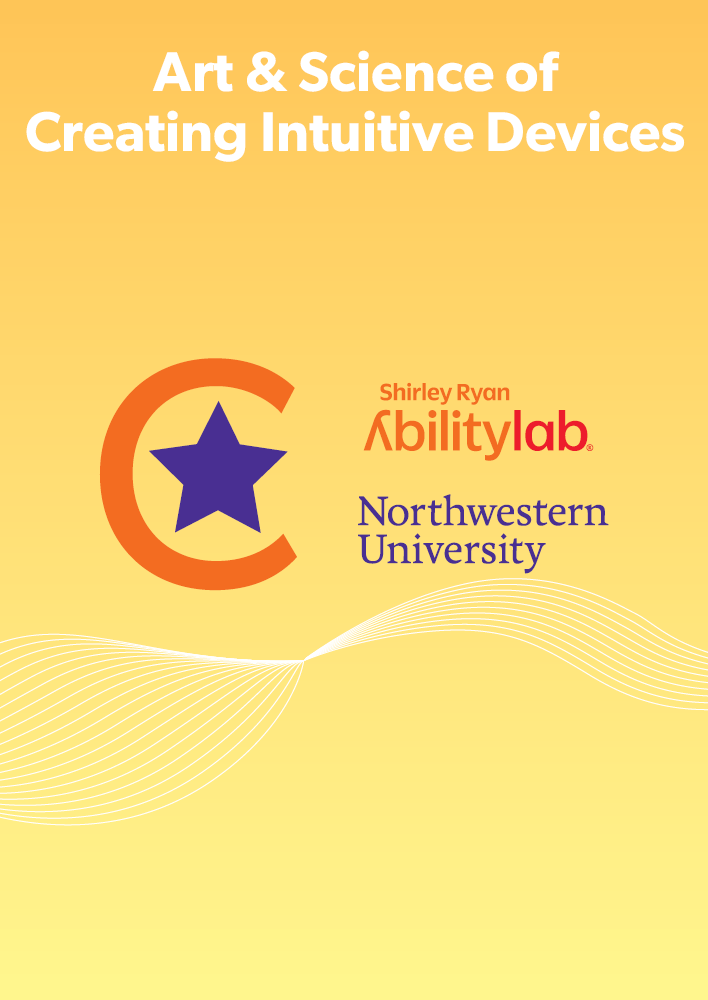
C-STAR Course: Art & Science of Creating Intuitive Devices
NOTE: This is an ON-DEMAND COURSE that is accessed virtually using the Academy Learning Portal. You will have three months from the date of registration to complete and review course materials. There is NO ACCREDITATION offered for this course.
DESCRIPTION
In the field of rehabilitation, devices that restore function and ability after a trauma or a debilitating medical condition can offer a lifeline to individuals and families. However, creating devices that mimic natural human movement and responses, restore sensation and aid in daily tasks can fall short in their usability, aesthetic appeal or often have a large learning curve. How do we create tools that achieve these functional goals, yet are so well designed that people can easily adopt them without these barriers? This recording of a five hour course will discuss human-centered design and how it’s applied to rehabilitation devices including prosthetics, wheelchairs and exoskeletons. Attendees will learn more about user interfaces and how human-centered design principles can be applied to create more intuitive devices. The day will end with a commercial panel of industry experts who will discuss their approach to design for the commercial market.
COURSE CHAIR
Levi Hargrove PhD
COURSE FACULTY
Brenna Argall, PhD
Jose González PhD
Homayoon Kazerooni, PhD
James Patton, PhD
Amy Schwartz, PhD
Jacob Segil, PhD
Katherine Strausser, PhD
AUDIENCE
Engineers, Data Scientists, Physical Therapists, Physical Therapist Assistants, Occupational Therapists, Occupational Therapy Assistants, Nurses, and Physicians
Upon completion of this course, participants will be able to:
- Compare the pros and cons of design elements that have been deployed in rehabilitation devices over time
- Identify key principles of user-centered design that can be applied to the development process for rehabilitation devices
TECHNOLOGY REQUIREMENTS
To participate, you will need access to a computer with an Internet connection. High-speed broadband access (LAN, Cable or DSL) is highly recommended.
- Internet connection: broadband wired or wireless (3G or better)
- Web browser:
- Latest stable version of one of the following: Apple Safari, Google Chrome, Mozilla Firefox or Microsoft Edge.
- JavaScript and Cookies enabled
- Speaker or headset to listen to audio files and participate in Zoom calls
- Do NOT use Internet Explorer, as it is not supported.
ABOUT C-STAR
The Center for Smart Use of Technologies to Assess Real World Outcomes (C-STAR) is one of six national resource centers comprising the Medical Rehabilitation Research Resource network (MR3) of the National Institutes of Health.
C-STAR is a joint grant between Northwestern University and Shirley Ryan AbilityLab, conceived out of a need to equip investigators with the skills and know-how to accurately employ technologies to measure and interpret data relevant to sensorimotor and cognitive function in the lab, clinic and real world. Our mission is to connect researchers with the right tools to develop and accurately assess technologies in the field of rehabilitation science. Leveraging the collective experience of clinicians, scientists, engineers and patients, our center provides the expertise, instruction and mentorship to empower researchers on the meaningful use of the vast array of technologies that are readily available but notoriously difficult to implement consistently across diverse patient populations. For more information on C-STAR: GO HERE